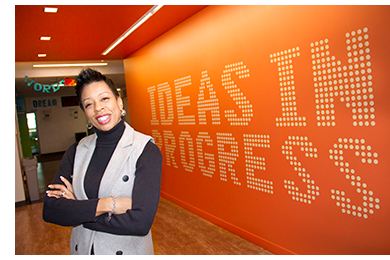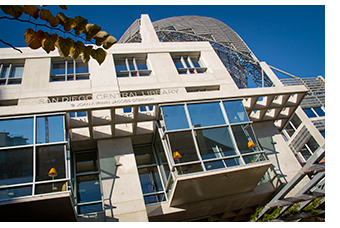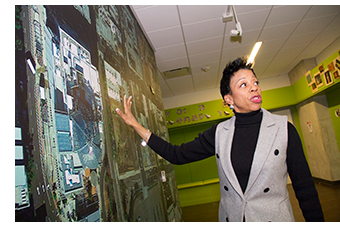Alumna Helen Griffith leads ‘most innovative’ high school, located in San Diego’s Central Library
By Anthony King
Photos by Erika Johnson/ University Communications

UC San Diego Division of Social Sciences alumna Helen Griffith had little interest in a career in education when she came to campus as a transfer student. There was no way, she said, she would work around the clock like her mother did as a teacher and principal, raising her children in Southeast San Diego. Children, it turned out, who loved the iconic Geisel Library.
There was something about Geisel — and about the library Griffith works in now, as executive director of e3 Civic High School located in the San Diego Central Library downtown — that provides a way for the 1981 Department of Communication graduate to connect her thoughts about how she made it to where she is now, balanced on a foundation she built at UC San Diego.
“The experience that I had as an undergraduate student gave me the strongest base, especially in communication, to go anywhere,” Griffith said in a recent sit-down interview, conducted in e3 Civic High’s vast open space they call “the park.”
“It also provided me with a strong, strong base that I was able to later go to graduate school and be successful on,” she said. “So I stand on [its] shoulders.”
Innovation at its core
The charter high school was recently named to the first “Most Innovative K-12 Schools in America” list from Noodle, a website that provides educational resources to families. Noodle examined 140,000 schools to come up with its list. CNN picked up the report, and featured e3 Civic High in its coverage.

“Innovation means doing whatever’s necessary to meet the end result, and not being tied to the old way of doing business,” Griffith said. “But also being free to incorporate the old way if it meets the goal. Innovation to me really is thinking about, by any means necessary, achieving the goals for the students.”
The school was included in the honor in part because it is located within the library — it sits on the sixth and seventh floors, with a separate, private entrance that visitors must be checked through. Griffith calls the library the school’s “chief partner.” Not only does the location give these students fingertip access to a world-class system, but the library also serves as a partner for cutting-edge technology initiatives: students are helping to test an augmented reality program, for example, as well as training and working in computer program internships. When the rest of us go to the library to learn in their IDEA lab, it’s likely we’ll have a trained e3 student showing us the ropes.
What’s more, Griffith and e3 Civic High are teaching these kids to change the world.
“Within everything that we do, we try to weave in an element of civic engagement, giving back and leadership,” Griffith said, who was named one of San Diego’s 50 people to watch in 2013 by San Diego Magazine. Among other honors, the founding principal of Millennial Tech Middle School received the 2010-11 Educator of the Year award from the California League of Middle Schools and the 2007 Outstanding African-American Educator of the Year from Pi Delta Kappa.
“In our project-based learning, there’s always an element of giving back,” Griffith said. “There’s this relevance — this authenticity — that we like to build in. It’s not a college requirement for service; it’s a way of life.”
Representing STEAM
With a goal of providing an education alternative for the downtown San Diego core, e3 Civic High School serves students primarily from underserved and underrepresented communities. Almost 90 percent of the students are of color and 77 percent are below the poverty level, Griffith said. With a curriculum focus on science, technology, engineering, arts and mathematics — STEAM, not STEM — the school has grand plans.
“We want to create the next generation of underrepresented students and female students in the STEAM professions,” she said matter-of-factly. It’s not just talk. Griffith can discuss any number of ways they are innovating the way underrepresented students interact with the arts and sciences. They have a robotics program, a Central Library-focused partnership in computer programming, a mentoring program with engineers in the community and a multiple-year project with students from the UC San Diego School of Medicine.
“Our vision is really to put [students] in their place of passion. Not everybody’s going to be a teacher, or an executive director, or a principal, or an author, but if that’s what gives you pleasure and drive and passion, then you need to be there,” Griffith said. “We need to create the fertile ground by which they can grow and thrive.”

So far, the results have been phenomenal, she said. Now in their third year, the first graduating class will get their high school diplomas in 2016: more than 70 students who took a gigantic leap of faith in 10th grade to come to a charter school with no history. Griffith said that at the time, she and the team were “selling a promise” to the children and their families.
When that first group of students arrived at e3 they were, for the most part, doing poorly in their classes, with some outright failing. But Griffith said her school provided a place for students looking for a second, or better, chance.
“To see how they are thriving, speaking, performing, communicating, creating and owning their selves,” she said of those original students, “they are taking ownership for their future.”
Get Griffith started about her memoires of UC San Diego, and she just might not be able to stop. She worked as a student assistant for the Office of the Vice Chancellor as well as OASIS. She read admissions applications, met her future sister-in-law while a student and, continuing her connection, spoke at Black Graduation Ceremony several years ago. She can name faculty and staff like they are family, too. Griffith ultimately earned her Ph.D. in educational leadership from San Diego State University.
“The opportunity that I was afforded at UC San Diego — of being in that world class library — now I get to afford that in a world class library to other students,” she said. “When you get your foundation somewhere, there’s something endearing about that.”